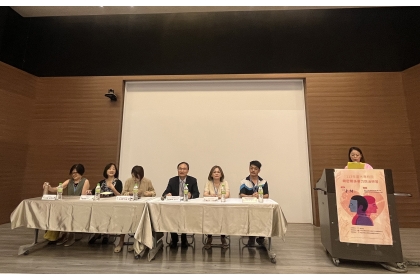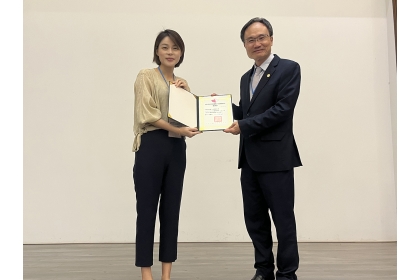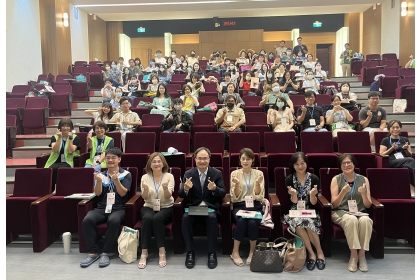Enhance counseling skills for intimate partner violence and create a gender-friendly campus environment.
2024-08-14
興新聞張貼者
Unit秘書室
1,206
Source:Office of Student Affair, NCHU
In recent years, the forms and patterns of digital sexual violence have become increasingly diverse and complex, even emerging as a new method of crime, with more and more people becoming victims. In light of this, the Ministry of Education, considering the needs of professionals in practical settings, has requested The Coordinating and Consultation Center for Counseling Work of Technological Universities and Colleges in Central Taiwan to plan a training session on the prevention of intimate partner violence for the 113th academic year. This training will be conducted by the Health and Counseling Center of the Office of Student Affairs of National Chung Hsing University on August 14, 2024, inviting counselors from nationwide colleges to participate in the prevention and discussion training.
The Director of the Gender Equality Education Division of the Ministry of Education's Student Affairs and Special Education Department, Pei-Yu Lin, the convener of the Coordinating and Consultation Center for Counseling Work of Technological Universities and Colleges in Central Taiwan, Fei-Chuan Chen, Vice President of National Chung Hsing University, Ching-Piao Tsai, Dean of the Office of Student Affairs, Chin-Ying Yang, and Director of the Health and Counseling Center, Jeng-Shane Lin, along with others, attended the opening ceremony. Vice President Tsai welcomed counseling personnel from across the country to National Chung Hsing University, which is committed to creating a friendly campus environment. In light of the increasing reports of gender equality incidents in recent years, the university is enhancing the promotion and prevention of gender equality education through various opportunities, such as mentor meetings and student activities. However, due to the inseparable connection between digital technology, the online world, and daily life, the rise of digital and online forms of intimate partner violence presents unprecedented challenges for campus prevention efforts. It is hoped that today’s workshop will help school counseling personnel understand the patterns of digital and online gender-based violence, enhance their sensitivity and professional knowledge, enable them to timely address incidents of intimate partner violence among students, provide more assistance and resources to students, and ensure the protection of students' personal safety.
In today's morning workshop session, Professor Nien-Hsuan Fang discussed various forms of digital/internet gender violence and shared practical cases. She mentioned the 10 types of digital and internet gender violence analysis published by the Executive Yuan and delved into the socio-cultural and gender scripts behind digital violence. At the same time, she analyzed relevant survey results, prompting deep reflection and discussion among the participants.
In the afternoon session, the speaker, counselor Li-Jiun Chang, discussed the reporting and lawful handling of gender-related incidents in schools, as well as the counseling for victims and perpetrators. She emphasized the importance of educational guidance in handling campus gender incidents and introduced the identification, reporting, and proper legal procedures for such events. Additionally, she shared counseling methods for victims and perpetrators of gender incidents, helping attendees better understand how to effectively respond to campus gender issues.
Intimate partner violence is a serious social issue. With the rapid advancement of technology, new forms of digital violence are springing up. Victims suffer severe harm to their physical and mental health, which also affects social harmony and stability. Through professional training, we aim to raise awareness and attention to this issue among counselors, providing them with relevant knowledge and skills to assist more students in need of help.
In recent years, the forms and patterns of digital sexual violence have become increasingly diverse and complex, even emerging as a new method of crime, with more and more people becoming victims. In light of this, the Ministry of Education, considering the needs of professionals in practical settings, has requested The Coordinating and Consultation Center for Counseling Work of Technological Universities and Colleges in Central Taiwan to plan a training session on the prevention of intimate partner violence for the 113th academic year. This training will be conducted by the Health and Counseling Center of the Office of Student Affairs of National Chung Hsing University on August 14, 2024, inviting counselors from nationwide colleges to participate in the prevention and discussion training.
The Director of the Gender Equality Education Division of the Ministry of Education's Student Affairs and Special Education Department, Pei-Yu Lin, the convener of the Coordinating and Consultation Center for Counseling Work of Technological Universities and Colleges in Central Taiwan, Fei-Chuan Chen, Vice President of National Chung Hsing University, Ching-Piao Tsai, Dean of the Office of Student Affairs, Chin-Ying Yang, and Director of the Health and Counseling Center, Jeng-Shane Lin, along with others, attended the opening ceremony. Vice President Tsai welcomed counseling personnel from across the country to National Chung Hsing University, which is committed to creating a friendly campus environment. In light of the increasing reports of gender equality incidents in recent years, the university is enhancing the promotion and prevention of gender equality education through various opportunities, such as mentor meetings and student activities. However, due to the inseparable connection between digital technology, the online world, and daily life, the rise of digital and online forms of intimate partner violence presents unprecedented challenges for campus prevention efforts. It is hoped that today’s workshop will help school counseling personnel understand the patterns of digital and online gender-based violence, enhance their sensitivity and professional knowledge, enable them to timely address incidents of intimate partner violence among students, provide more assistance and resources to students, and ensure the protection of students' personal safety.
In today's morning workshop session, Professor Nien-Hsuan Fang discussed various forms of digital/internet gender violence and shared practical cases. She mentioned the 10 types of digital and internet gender violence analysis published by the Executive Yuan and delved into the socio-cultural and gender scripts behind digital violence. At the same time, she analyzed relevant survey results, prompting deep reflection and discussion among the participants.
In the afternoon session, the speaker, counselor Li-Jiun Chang, discussed the reporting and lawful handling of gender-related incidents in schools, as well as the counseling for victims and perpetrators. She emphasized the importance of educational guidance in handling campus gender incidents and introduced the identification, reporting, and proper legal procedures for such events. Additionally, she shared counseling methods for victims and perpetrators of gender incidents, helping attendees better understand how to effectively respond to campus gender issues.
Intimate partner violence is a serious social issue. With the rapid advancement of technology, new forms of digital violence are springing up. Victims suffer severe harm to their physical and mental health, which also affects social harmony and stability. Through professional training, we aim to raise awareness and attention to this issue among counselors, providing them with relevant knowledge and skills to assist more students in need of help.




